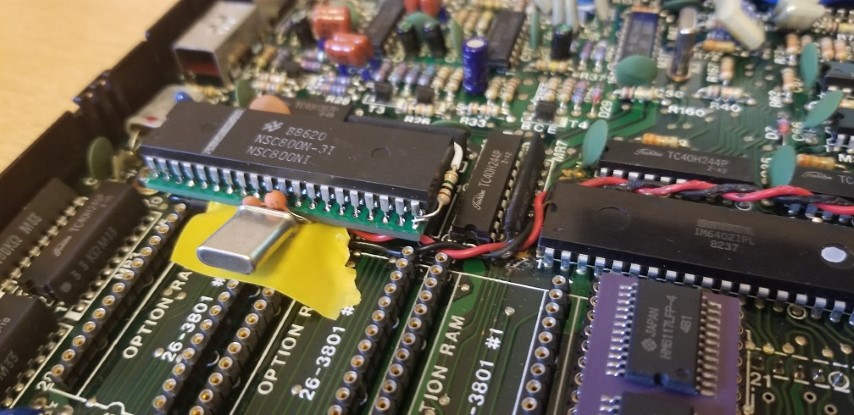NSC800 Conversion: Difference between revisions
No edit summary |
|||
| Line 29: | Line 29: | ||
1. Inversion of the interrupt signals | 1. Inversion of the interrupt signals | ||
2. Conversion of the 50/50 duty cycle RST7.5 signal to a 100 usec low pulse | 2. Conversion of the 50/50 duty cycle RST7.5 signal to a 100 usec low pulse | ||
3. And in the case of a dual processor conversion, certain NSC800 signals are not tri-state in RESET. | 3. 4.9152 MHZ clock generation circuitry. | ||
4. And in the case of a dual processor conversion, certain NSC800 signals are not tri-state in RESET. | |||
While I have implemented both a DUAL 80C85/NSC800 CPU adapter, and a SINGLE NSC800 CPU conversion, I prefer the single conversion for it's simplicity. | While I have implemented both a DUAL 80C85/NSC800 CPU adapter, and a SINGLE NSC800 CPU conversion, I prefer the single conversion for it's simplicity. | ||
Revision as of 04:40, 6 October 2020
Work in progress!
What is this all about?
Motivated by 2 things
- discovery of the NSC800 Z80 processor that is 80C85 like
- continuing to work in the direction of CP/M
I have invested some time and effort in developing a conversion that supports NSC800 operation in the M100, both for standard BASIC use, as well as CP/M (in conjunction with REXCPM). Partly this has been motivated simply by curiosity. However, in CP/M it actually broadens the software applicability since quite a bit of CP/M software is Z80.
If you have an interested in doing this conversion please get in touch with me at Twospruces at --the google mail service.
There are 2 areas of change that are needed. Firstly you have to adapt the NSC800 to the 80C85 socket. There are a couple of tradeoffs to make. Secondly, the NSC800 needs to use a slightly different Main ROM.
To get started on this project, one can leverage the work done in the past. In fact an NSC800 conversion for 80C85 was posted back in the early 80s for S100 computers equipped with an 8080/8085 processor board. The information is posted below, from Microsystems September 1984.
This article lists considerations; from my work in M100 the things that any adapter has to deal with are listed below.
1. Inversion of the interrupt signals 2. Conversion of the 50/50 duty cycle RST7.5 signal to a 100 usec low pulse 3. 4.9152 MHZ clock generation circuitry. 4. And in the case of a dual processor conversion, certain NSC800 signals are not tri-state in RESET.
While I have implemented both a DUAL 80C85/NSC800 CPU adapter, and a SINGLE NSC800 CPU conversion, I prefer the single conversion for it's simplicity.
Acknowledgements
I would like to acknowledge and thank those that have contributed to the project:
Philip Avery - for efforts with CP/M and attached Video using the VT100 Adapter
